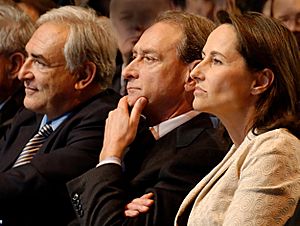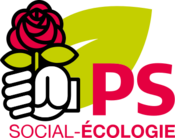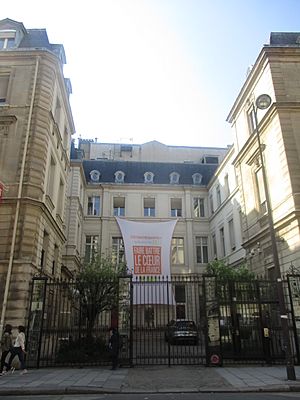Socialist Party (France) facts for kids
Quick facts for kids <div style="padding-top:0.3em; padding-bottom:0.3em; border-top:2px solid Lua error in Module:European_and_national_party_data/config at line 227: attempt to index field 'data' (a nil value).; border-bottom:2px solid Lua error in Module:European_and_national_party_data/config at line 227: attempt to index field 'data' (a nil value).; line-height: 1;">
Socialist Party
Le Parti socialiste
|
|
|---|---|
 |
|
| Abbreviation | PS |
| First Secretary | Olivier Faure |
| President in the National Assembly | Boris Vallaud |
| President in the Senate | Patrick Kanner |
| Founders | François Mitterrand Alain Savary |
| Founded | 4 May 1969 |
| Merger of |
See list
SFIO
CIR UCRG UGCS |
| Headquarters | 99 Rue Molière, 94200 Ivry-sur-Seine |
| Newspaper | Le Populaire (1969–1970) |
| Youth wing | Young Socialist Movement |
| LGBT wing | Homosexualités et Socialisme |
| Membership (2024) | |
| Ideology | Social democracy Pro-Europeanism |
| Political position | Centre-left to left-wing |
| National affiliation | New Popular Front (2024–present) NUPES (2022–2024) |
| European affiliation | Party of European Socialists |
| International affiliation | Progressive Alliance Socialist International |
| European Parliament group | Progressive Alliance of Socialists and Democrats |
| Colours | Pink and green |
| Anthem | "Il faut tourner la page" ('We must turn the page') (since 2010) |
| National Assembly | Lua error in Module:European_and_national_party_data/config at line 227: attempt to index field 'data' (a nil value). |
| Senate | Lua error in Module:European_and_national_party_data/config at line 227: attempt to index field 'data' (a nil value). |
| European Parliament | Lua error in Module:European_and_national_party_data/config at line 227: attempt to index field 'data' (a nil value). |
| Presidency of Regional Councils |
5 / 17
|
| Presidency of Departmental Councils |
22 / 95
|
| Website | |
| Lua error in Module:European_and_national_party_data/config at line 227: attempt to index field 'data' (a nil value). | |
The Socialist Party (French: Le Parti socialiste, or PS) is a major political party in France. It is known for its centre-left to left-wing ideas. The party believes in social democracy, which means they support a strong welfare state and economic fairness. They are also pro-European, meaning they support closer ties and cooperation within Europe.
For many years, the PS was one of the two biggest political parties in France. It was founded in 1969 when several socialist groups joined together. One of its most famous leaders was François Mitterrand, who became president of France in 1981. The party has been a member of important international groups like the Party of European Socialists and the Socialist International. Currently, Olivier Faure is the First Secretary, leading the party.
Contents
- History of the Socialist Party
- Early Socialist Movements in France
- Challenges and Splits (Early 1900s)
- After World War II and Decline
- The Socialist Party is Born (1969)
- Mitterrand Becomes President (1981–1995)
- Jospin and the Plural Left (1995–2002)
- After 2002 and New Challenges
- 2007 and 2012 Presidential Elections
- Recent Elections (2017-2024)
- Party Leaders
- Election Results
- See also
History of the Socialist Party
Early Socialist Movements in France
After a big event called the Paris Commune in 1871, socialist groups in France became much weaker. But new parties soon started to form. The first French socialist party, the Federation of the Socialist Workers of France (FTSF), began in 1879. It wanted to make changes slowly, step by step. Other groups, like the French Workers' Party and the Revolutionary Socialist Workers' Party, also formed. Famous socialist leaders like Jean Jaurès were important figures even without belonging to a specific party at first.
In 1905, many of these groups came together to form the French Section of the Workers' International (SFIO). Jean Jaurès was a very influential leader of this new party.
Challenges and Splits (Early 1900s)
The SFIO faced challenges from other political groups. They were also divided on whether to join governments with non-socialist parties. When World War I started in 1914, the party was against the war. However, after Jaurès was killed, they couldn't stop the wave of support for the war.
In 1920, a big split happened. Many members left to form the French Communist Party, which wanted to join a worldwide communist movement. The remaining members, led by Léon Blum, continued as the SFIO.
In the 1920s and 1930s, the Socialists sometimes worked with other left-wing parties. In 1936, they joined the Popular Front and won elections. For the first time, the SFIO became the leading party on the left, and Léon Blum became France's first SFIO Prime Minister. However, his government lasted only about a year.
After World War II and Decline
After France was freed in 1944, the SFIO worked with the powerful French Communist Party and other groups. They helped create France's welfare state, which provides support for people. But this alliance didn't last long because of the Cold War.
The SFIO's popularity went down in the 1960s. In 1965, they supported François Mitterrand, a politician who was against the current government, for president. He did surprisingly well, becoming a key leader for the non-Communist left.
The Socialist Party is Born (1969)
In 1969, the SFIO was replaced by the new Socialist Party (PS). Other groups joined it, including those led by François Mitterrand. In 1971, Mitterrand became the leader of the PS. He wanted to work closely with the Communist Party to win elections. In 1972, the PS and the Communist Party signed a "Common Programme" to work together.
The PS started to gain more votes, even more than the Communist Party. In the 1974 presidential election, Mitterrand almost won. However, the alliance with the Communists eventually broke down.
Mitterrand Becomes President (1981–1995)
In 1981, François Mitterrand won the presidential election, becoming the first socialist president of France's Fifth Republic. His party also won a large majority of seats in the National Assembly.
Mitterrand's government made many big changes. They took control of banks, insurance companies, and defense industries for the state. They also increased workers' wages and reduced working hours. Important reforms included ending the death penalty and creating a solidarity tax on wealth for rich people.
However, France faced economic problems. In 1982, Mitterrand decided to focus on keeping France part of the European economic system, which meant slowing down some of his socialist reforms. By 1984, the government stopped most new socialist policies.
The PS lost its majority in 1986, and Mitterrand had to work with a conservative government. He was re-elected president in 1988 with a more moderate plan. During his second term, he focused on foreign policy and European cooperation.
Towards the end of his presidency, the party faced financial scandals and internal disagreements. In the 1993 elections, the PS lost a lot of seats.
Jospin and the Plural Left (1995–2002)
In 1995, Lionel Jospin became the PS candidate for president. He lost to Jacques Chirac, but his good performance helped the party recover.
In 1997, the PS formed a group called the "Plural Left" with other left-wing parties, including the Communists and the Greens. This alliance won the 1997 elections, and Jospin became Prime Minister. His government introduced a law that reduced the working week to 35 hours and created universal health insurance.
In the 2002 presidential election, Jospin was surprisingly eliminated in the first round. The PS then asked its supporters to vote for Chirac to stop a far-right candidate from winning. After this, Jospin left politics, and the "Plural Left" lost the next election.
After 2002 and New Challenges
François Hollande became the First Secretary of the party in 1997 and was re-elected in 2003. In 2004, the Socialists made a big comeback in regional elections, winning control of most regions in France.
However, the party faced disagreements, especially over the proposed European Constitution in 2005. Some members supported it, while others campaigned against it. This caused some tension within the party.
2007 and 2012 Presidential Elections

In 2006, party members chose Ségolène Royal as their candidate for the 2007 French presidential election. She reached the second round but lost to Nicolas Sarkozy. After this, some party leaders blamed Royal for the loss.
In 2011, the Socialist Party held an open primary election to choose their candidate for the 2012 French presidential election. François Hollande, a former party leader, won the primary. He then went on to defeat Nicolas Sarkozy in the presidential election on May 6, 2012, becoming the new president of France.
Recent Elections (2017-2024)
In the 2017 French presidential election, the Socialist Party's candidate, Benoît Hamon, finished in fifth place. This was a very low result for the party. After the election, the party lost many seats in the National Assembly, going from 280 seats to only 30.
Due to financial problems, the party had to sell its historic headquarters in Paris in 2017 and moved to a smaller office. In 2018, Olivier Faure was elected as the new First Secretary.
In the 2022 French presidential election, the Socialist Party candidate, Anne Hidalgo, received the lowest percentage of votes in the party's history.
For the 2022 French legislative election, the Socialist Party joined a left-wing alliance called the New Ecologic and Social People's Union (NUPES). As part of this alliance, the PS won 27 seats in the National Assembly.
In the 2024 French legislative election, the party again joined a left-wing alliance, the New Popular Front. This alliance helped the Socialist Party more than double its seats in the National Assembly.
Party Leaders
The Socialist Party has had several leaders, called "First Secretaries," since its creation:
- Alain Savary (1969–1971)
- François Mitterrand (1971–1981)
- Lionel Jospin (1981–1988)
- Pierre Mauroy (1988–1992)
- Laurent Fabius (1992–1993)
- Michel Rocard (1993–1994)
- Henri Emmanuelli (1994–1995)
- Lionel Jospin (1995–1997)
- François Hollande (1997–2008)
- Martine Aubry (2008–2012)
- Harlem Désir (2012–2014)
- Jean-Christophe Cambadélis (2014–2017)
- Rachid Temal (2017–2018; acting)
- Olivier Faure (2018–present)
Election Results
The Socialist Party takes part in different elections in France and Europe. Here are some of their results:
Presidential Elections
| Election year | Candidate | First round | Second round | Result | ||||
|---|---|---|---|---|---|---|---|---|
| Votes | % | Rank | Votes | % | Rank | |||
| 1974 | François Mitterrand | 11,044,373 | 43.25 | 12,971,604 | 49.19 | Lost | ||
| 1981 | 7,505,960 | 25.85 | 15,708,262 | 51.76 | Won | |||
| 1988 | 10,367,220 | 34.10 | 16,704,279 | 54.02 | Won | |||
| 1995 | Lionel Jospin | 7,097,786 | 23.30 | 14,180,644 | 47.36 | Lost | ||
| 2002 | 4,610,113 | 16.18 | N/A | Lost | ||||
| 2007 | Ségolène Royal | 9,500,112 | 25.87 | 16,790,440 | 46.94 | Lost | ||
| 2012 | François Hollande | 10,272,705 | 28.63 | 18,000,668 | 51.64 | Won | ||
| 2017 | Benoît Hamon | 2,291,288 | 6.36 | N/A | Lost | |||
| 2022 | Anne Hidalgo | 616,478 | 1.75 | N/A | Lost | |||
National Assembly Elections
| National Assembly | |||||||||||||||||
| Year | 1st round | 2nd round | Seats | +/– | Result | Note | |||||||||||
|---|---|---|---|---|---|---|---|---|---|---|---|---|---|---|---|---|---|
| Votes | % | ± pp | Rank | Votes | % | ± pp | Rank | ||||||||||
| 1973 | 4,559,241 | 19.18% | 5,564,610 | 23.72% |
89 / 491
|
Opposition | In coalition with the MRG | ||||||||||
| 1978 | 6,451,151 | 22.58% | 7,212,916 | 28.31% |
104 / 491
|
Opposition | |||||||||||
| 1981 | 9,432,362 | 37.52% | 9,198,332 | 49.25% |
269 / 491
|
Government | In coalition with the MRG | ||||||||||
| 1986 | 8,693,939 | 31.02% | N/A |
206 / 573
|
Opposition | ||||||||||||
| 1988 | 8,493,702 | 34.77% | 9,198,778 | 45.31% |
260 / 577
|
Government | |||||||||||
| 1993 | 4,415,495 | 17.61% | 6,143,179 | 31.01% |
59 / 577
|
Opposition | |||||||||||
| 1997 | 5,977,045 | 23.49% | 9,722,022 | 38.20% |
255 / 577
|
Government | |||||||||||
| 2002 | 6,086,599 | 24.11% | 7,482,169 | 35.26% |
140 / 577
|
Opposition | |||||||||||
| 2007 | 6,436,520 | 24.73% | 8,624,861 | 42.27% |
186 / 577
|
Opposition | |||||||||||
| 2012 | 7,618,326 | 29.35% | 9,420,889 | 40.91% |
279 / 577
|
Government | |||||||||||
| 2017 | 1,685,677 | 7.44% | 1,032,842 | 5.68% |
30 / 577
|
Opposition | |||||||||||
| 2022 | 860,201 | 3.78% | 1,084,909 | 5.23% |
28 / 577
|
Opposition | In coalition with the NUPES | ||||||||||
| 2024 | 2,774,088 | 8.65% | 2,634,176 | 9.66% |
65 / 577
|
Opposition | In coalition with the New Popular Front | ||||||||||
European Parliament Elections
| Election | Leader | Votes | % | Seats | +/– | EP Group |
|---|---|---|---|---|---|---|
| 1979 | François Mitterrand | 4,763,026 | 23.53 (#2) |
20 / 81
|
New | SOC |
| 1984 | Lionel Jospin | 4,188,875 | 20.76 (#2) |
20 / 81
|
||
| 1989 | Laurent Fabius | 4,286,354 | 23.61 (#2) |
17 / 87
|
||
| 1994 | Michel Rocard | 2,824,173 | 14.49 (#2) |
15 / 87
|
PES | |
| 1999 | François Hollande | 3,873,901 | 21.95 (#1) |
18 / 78
|
||
| 2004 | 4,960,756 | 28.90 (#1) |
31 / 74
|
|||
| 2009 | Martine Aubry | 2,838,160 | 16.48 (#2) |
14 / 74
|
S&D | |
| 2014 | Jean-Christophe Cambadélis | 2,649,202 | 13.98 (#3) |
12 / 74
|
||
| 2019 | Raphaël Glucksmann | 1,403,170 | 6.19 (#6) |
3 / 79
|
||
| 2024 | 3,401,076 | 13.80 (#3) |
10 / 81
|
See also
 In Spanish: Partido Socialista (Francia) para niños
In Spanish: Partido Socialista (Francia) para niños
- French Section of the Workers' International
- New Left group
- Socialist and Republican group
- Terra Nova (think tank)



